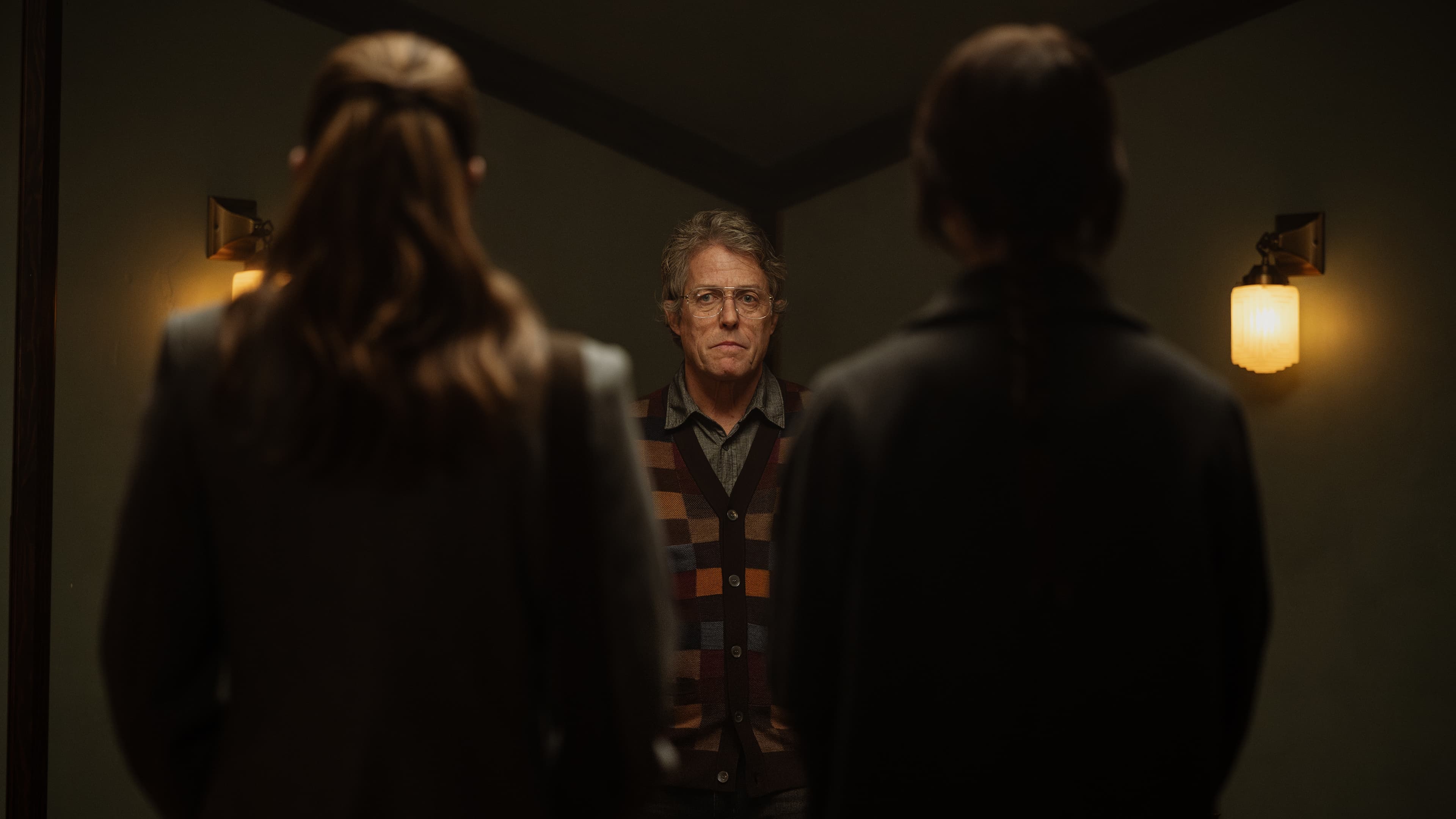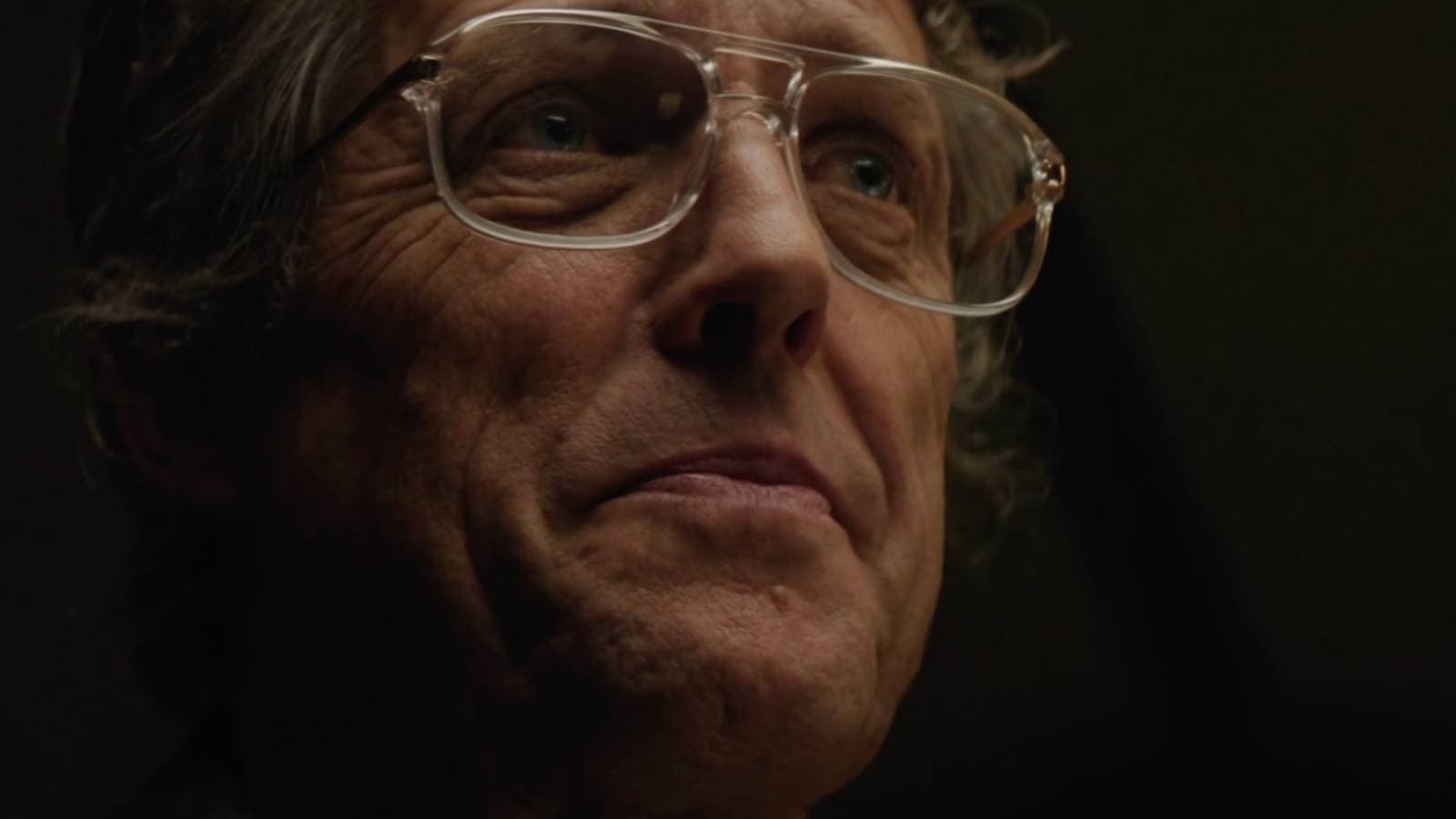
A24 has always taken a chance on weirder projects. Its almost part of their brand at this point to say yes where other production companies would say no. And while its had a pretty decent track record, its usually their horror films – Hereditary, Talk to Me, I Saw the TV Glow – that have the greatest return on investment. So, it was easy to see why hype was building for Heretic. A religious psychological horror with stunning cinematography by Park Chan-wook veteran, Chung Chung-hoon and a scenery chewing Hugh Grant attached as a villain; honestly who wouldn’t be excited?
I was certainly keen. However, I had made the mistake of looking up the pair of filmmakers who were tasked with leading such a creative tour de force. Scott Beck and Bryan Woods are most known for writing the first Quiet Place film for director John Krasinski. At the time, their screenplay was praised for prioritising sound in the big print (action lines) rather than visuals in order to communicate the film’s atmosphere and tension. Yet, they have fallen out of favour with audiences in the years since, as their solo directing efforts have led to either forgettable studio action movies like last year’s 65 or lacklustre Blumhouse-esque horrors like Haunt (2019).
Nevertheless, the trailer was enough to suck me in, and I was even hopeful that with the support of an indie powerhouse like A24 behind them, Beck and Woods, finally free from the meddling of studio execs, would be able to pull off a miracle.
Luckily, the film sets up just the right mood, as two young Mormon missionaries stare out at a mossy cliffside, chatting about condom sizes. Their conversation is just unserious enough to tell an audience what kind of girls they are; that while they’re pious, they’re immature enough to be swayed in their own beliefs. On the girls usual rounds of door to door pamphlet pushing, the more experienced Sister Barnes (Sophie Thatcher) offers to help the naive Sister Paxton (Chloe East) improve her conversion rate. But as the pair are either ignored by the adults around them or mocked by local youths – one even going as far as pantsing Sister Paxton in public – it seems today of all days will be less than successful. But hope is found in Mr. Reed (Hugh Grant), whose open interest in Mormon theology has already been documented by the church. So, as rain begins to buckle down and with nothing left to lose except a shameful walk back to the church, the exhausted Sisters ring his doorbell.

Mr. Reed is better than either of the girls could have hoped. He’s a polite older gentleman, whose gaiety couldn’t be more infectious. Yet, they give pause when he’s almost too eager to invite them in, as they cannot be alone with a man without another woman present in the home. Apologetic, Reed confirms that his wife is inside baking a delicious blueberry pie and encourages the girls to come in for something to eat. Once inside, Sister Barnes and Sister Paxton are calmed by the smell of pie wafting from the kitchen. And with Reed’s already extensive knowledge of the Book of Mormon – of which he already has a fully annotated copy stashed in his cupboard – Sister Paxton is guaranteed to have at least one success today. But it’s the little things that make Sister Barnes feel uneasy, the metal in the walls, the pointed questions from Reed about her family and past, and that despite their repeated insistence that his wife be present, he disappears into the back of the house, only to come back with more excuses. It’s only during one of these disappearances that everything clicks, as Sister Barnes notices a scented candle on the coffee table. Its scent: Blueberry Pie. With the front door locked by a ‘faulty’ mechanism, the Sisters decide to talk their way out of leaving before Mr. Reed catches on. But to their surprise, their ever so cordial host is more than happy for them to head home – they’ll just have to use the door at the back of the house.
Heretic’s strength lies in the escalation of its mystery. Each new question poses greater ones. The film is eager for us to follow the girls down a rabbit hole of faith, existence and purpose without Reed ever keeping us in the loop. The house set is expertly built to be at once homely and unrecognisable. Corridors stretch and wind, stairs drop down into dank dungeons. Meanwhile library shelves stacked with texts and incandescent lights bathe rooms in a warm glow and feel. It’s decidedly English gothic in its setting, but American gothic in tone. The film has been heavily compared to Barbarian (2022) ** online the way the camera and edit explore the house, and how each new room is a foreboding reveal all on its own. It’s an ever changing being that constantly keeps you guessing. But I would argue it alludes more closely to something like Willy Wonka and the Chocolate Factory (1971), in which the increasingly expansive factory holds a test in each room, and only those children smart and kind enough to move forward will have access to the ‘true’ prize.
Speaking of Wonka, Hugh Grant’s Reed is devilishly sincere and the highlight of the entire film – a contrast to the Oompa Loompa role he notably despised. Reed is written well enough – even if his little factoids might be grating for some – but Grant’s gift of the gab and his ability to indulge in a small amount camp glues the whole character together. You expect his mask to slip into abject disgust at any moment, but he never does, and you realise he never had a mask to begin with. The scariest thing about Reed is the earnestness of his theological pursuits. He may deceive the girls to get them right where he wants: but he never hides his true self from them. Chung-hoon supports Reed with an uncomfortable closeness or a dutch angle here and there to really hone in on how creepy a simple smile or frown from Grant can be. Meanwhile, sound designer Chris Duesterdiek ratchets up Grant’s smallest mannerisms, turning his claps or the opening of his mouth into it’s own form of jump scare. Everything culminates into a wonderful setup for the frightful journey ahead. And while Reeds monologues are a delight to hear, it leaves the audience asking one question: where exactly are we going with all this?

Without spoiling what it is exactly that Reed “found” in his extensive study, I fear his results will disappoint most audience members. Like his many monologues before, the ‘truth’ that the one true religion offers has same depth of thought as a r/Atheism post or a quick dive down the sophistry YouTube rabbit hole. Worst of all, the film almost seems to distance itself from any folk or cosmic horror, as if it’s too clever for something as juvenile as the supernatural. It felt like there was a balloon filling with all this great tension, but when it came time to popping it, someone had forgot to tie up the bottom, so it just sadly deflated out all that energy into hot, wet air. Woods and Beck, despite all their newfound freedom, still feel shackled to Studio Hell; clinging to the style that made their writing a success in the first place. Their insistence on PG-13 (M) horror that refuses to go farther than a few trickles of blood and limp body here and there is disappointing to say the least. And God forbid they try and push the religious angle a bit harder. As, by not ruffling to many pious feathers, Reed weakens as a villain. Even with all of Grant’s wonderfully realised acting, the resulting plot forces Reed to end on a painfully pitiful whimper.
Heretic, by having A24’s blessing, is able to pull out all the stops to create a great horror premise. But unfortunately, I don’t think Beck and Woods really knew what to do with themselves, much less were ready for something this complex. Nevertheless, I would watch it all again, just to spend two more hours watching Hugh Grant having the time of his life.